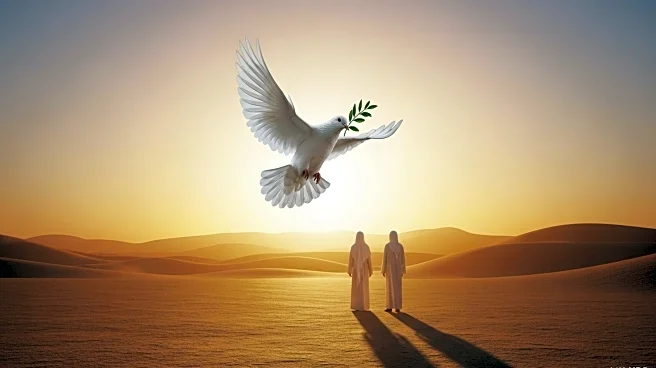What's Happening?
Hamas has released all 20 remaining living hostages held in Gaza as part of a ceasefire agreement, marking a significant pause in the two-year conflict that has devastated the region. The hostages, all men, were freed in two groups and are now being reunited with their families and undergoing medical checks. The ceasefire, which follows intense international pressure, aims to end the deadliest war between Israel and Hamas, a conflict that began with a surprise attack by Hamas-led militants on southern Israel in October 2023. The war has resulted in over 67,000 Palestinian deaths and significant destruction in Gaza. As part of the ceasefire, humanitarian aid is expected to flow into Gaza, addressing severe shortages and famine conditions. President Trump has arrived in Israel to discuss the U.S.-proposed postwar plans and is expected to meet with families of the hostages and speak at the Knesset.
Why It's Important?
The release of hostages and the ceasefire represent a critical juncture in the Israeli-Palestinian conflict, potentially paving the way for peace and reconstruction in Gaza. The involvement of President Trump underscores the U.S.'s role in mediating Middle Eastern conflicts and shaping postwar governance. The ceasefire agreement could lead to significant geopolitical shifts, including the potential disarmament of Hamas and changes in Gaza's governance structure. The humanitarian aid accompanying the ceasefire is crucial for addressing the dire conditions in Gaza, where much of the infrastructure has been destroyed and the population displaced. The broader implications include potential stabilization in the region and a reduction in global tensions related to the conflict.
What's Next?
President Trump is set to co-chair a summit in Egypt with President Abdel-Fattah el-Sissi, focusing on the future of Gaza and the broader Middle East. The summit will involve leaders from over 20 countries, discussing the governance of Gaza and the role of the Palestinian Authority. The U.S. plan proposes an international body to oversee Gaza, with Palestinian technocrats managing day-to-day affairs. The plan also includes an Arab-led international security force and Palestinian police trained by Egypt and Jordan. The future of Hamas and its disarmament remains a contentious issue, as does the potential establishment of a Palestinian state, which faces opposition from Israeli leadership.
Beyond the Headlines
The ceasefire and hostages' release highlight the complex ethical and humanitarian dimensions of the conflict, including the treatment of prisoners and the impact on civilian populations. The international community's role in mediating and enforcing peace agreements raises questions about sovereignty and the effectiveness of external intervention in regional conflicts. The long-term governance of Gaza and the potential for a Palestinian state involve significant cultural and political challenges, requiring cooperation among diverse stakeholders. The situation also reflects broader themes of reconciliation and justice in post-conflict societies.









